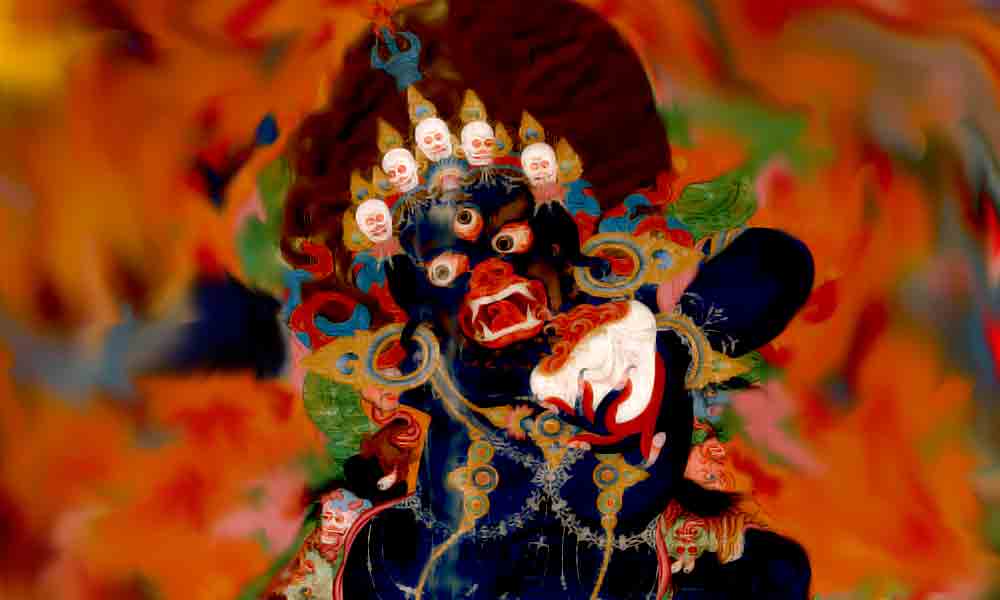
Mahamrtyunjaya Mantram to Conquer Death

Kala Bhairava, the god of Death
Guidelines for pronunciation are in the footnotes
Death has a great significance in Hinduism. It is considered one of the highest manifestations of Brahman himself. The lord of the mortal word is Death. Everything is food for him. In the Vedas Lord Shiva (Rudra) is personified as the god of Death and destruction. The idea of liberation in Hinduism arises from the belief that beings in the mortal world are caught in the cycle of births and deaths and suffer until they find an escape. None can escape from death. However, one can avoid it or delay it with divine help. Hence, the same Vedas which describe Shiva as the god of destruction also extol him as healer and protector. The following mantra is uttered by many to ward off evil, accidents, sickness, physical harm and death, and to prolong life.
A Prayer to Conquer Death and Sickness and Prolong Life
Aum, thrayambakam yajaamahe sugandhim pushtivardhanam
urvaaruka miva bandhanan mrutyo ruksheeya maamruthaath
Suggestions for Further Reading
- A Prayer During a Pradakshina at a A Hindu Temple
- Ganapathya Atharvashirsham
- Shri Ganesha Ashtotthara Sathanama Puja
- Everyday Prayers to Lord Ganesha
- Maha Ganesha Pancha-ratnam
- A Morning Prayer to Lord Ganesha
- Sankata-naasana Ganapathi Sthothram
- A Hindu Prayer, Ganeshashtakam
- Ganesha Shodhasa Naama Puuja
- Sri Krishna Ashtakam
- Sri Krishna Dvadasanama Sthothram
- Mahamrtyunjaya Mantram
- Navagraha Dhyana Slokam
- Popular Mantras and Prayers
- Salutations to Dikpalas, Rishis and Devathas
- Shani Shothram - A Prayer to Shani
- Popular Prayers of Shakti, Devi, Mother Goddess
- English Devotional Prayers to Hindu Gods and Goddesses
- Popular Prayers of Lord Ganesha
- Popular Prayers of Lord Krishna
- Popular Prayers of Goddess Lakshmi
- Navagraha Dhyana Slokam
- Popular Prayers of Vishnu
- The Dream and Despair of a Yogi
- The Idolaters - The Idol(H)aters
- Chidlren of Darkness - Kali Yuga
- Devotional Prayers to Lord Shiva
- The Vedas as the Source of Valid Knowledge
- Hymns from the Rig Veda
- The Meaning and Concept of Mantra in Hinduism
- Praying With the Right Attitude
- Why and How Should We Pray? The Prayer Purpose
- Essays On Dharma
- Esoteric Mystic Hinduism
- Introduction to Hinduism
- Hindu Way of Life
- Essays On Karma
- Hindu Rites and Rituals
- The Origin of The Sanskrit Language
- Symbolism in Hinduism
- Essays on The Upanishads
- Concepts of Hinduism
- Essays on Atman
- Hindu Festivals
- Spiritual Practice
- Right Living
- Yoga of Sorrow
- Happiness
- Mental Health
- Concepts of Buddhism
- General Essays
Guidelines to pronunciation: Sanskrit is essentially a language of sounds and sound vibrations. The efficacy of Sanskrit prayers depends upon the vibrations that are produced during chanting. It is difficult to transliterate Sanskrit words into English with full justification to the original sounds. In the above stated transliteration we followed a simple approach to make it easier even for those who are not familiar with English or Sanskrit. Wherever you find repeat vowels (aa, uu, ee) please stretch the vowel sound (for ex., aa as in vast or path, uu as in cool or root, ee as in eel or feel). Similarly, "ai" should be pronounced as in gait, fight, or tight. Th should be pronounced as in think or thick, but when t alone is used, it should be pronounced as in two, top or tip.